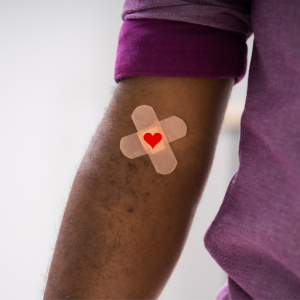8 Myths About Blood Donation

At what pivotal time will you or a loved one need blood? Millions of patients nationwide need lifesaving blood products—including many within our own community. Blood donation benefits local patients battling cancer, kidney transplant recipients, those with sickle cell disease, new mothers, premature babies and trauma victims. Nearly 40 percent of people eligible to donate will not because they mistakenly believe common myths about blood donation. Do any of these sound familiar?
I can’t donate because…
- “I take high blood pressure medications.” Medications for blood pressure management do not disqualify you from donating. In fact, in most cases, medications don’t prevent donation.
- “I had surgery.” You can donate after surgery as long as there is no infection and no blood was transfused once released from your doctor’s care.
- “I am a vegetarian.” A healthy diet that includes iron-rich foods including beans, broccoli and spinach will provide you the nutrients you need to donate.
- “My blood type isn’t needed.” All blood groups are needed, especially common types because more common types need blood.
- “I am too young or too old.” You can donate blood beginning at 16 years old (with a parental consent form) with no upper limit to donate.I
- “I got the COVID-19 and/or flu vaccine.” Neither the COVID-19 or flu vaccine prohibits you from blood donation. For most other vaccines like MMR, you can donate after four weeks.
- “I am a cancer survivor.” Cancer survivors can donate one year after the completion of treatment.
- “I got a tattoo.” If your tattoo was completed by a licensed facility in a regulated state, there’s no time limit. You can also donate following a piercing as long as the equipment was sterile and single use.
Interested in making a blood donation?
Memorial Health hospitals host blood drives throughout the year. To learn more about upcoming blood drives at our locations, visit Impact Life.